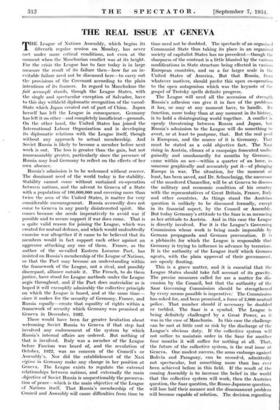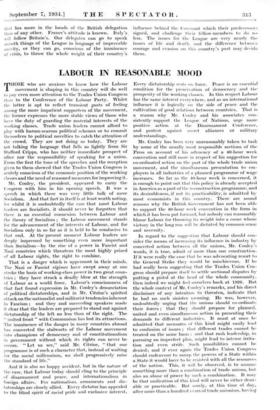THE REAL ISSUE AT GENEVA
THE League of Nations Assembly, which begins its fifteenth regular session on Monday, has never met under more critical conditions, not even at the moment when the Manchurian conflict was at its height. For the crisis the League has to face today is in large measure the result of its failure then—how far an in- evitable failure need not be discussed here—to carry out the provisions of the Covenant according to the plain intentions of its framers. In regard to Manchukuo the fait accompli stands, though the League States, with the single and spectacular exception of Salvador, have to this day withheld diplomatic recognition of the vassal- State which Japan created out of part of China. Japan herself has left the League in consequence. Germany has left it on other—and completely insufficient—grounds. On the other hand, the United States has joined the International Labour Organization and is developing its diplomatic relations with the League itself, though without any approach to actual membership. And Soviet Russia is likely to become a member before next week is out. The loss is greater than the gain, but not immeasurably greater, particularly since the presence of Russia may lead Germany to reflect on the effects of her own absence.
Russia's admission is to be welcomed without reserve. The dominant need of the world today is for stability. Stability cannot come without sustained co-operation between nations, and the advent to Geneva of a State with a population of 160,000,000 and covering more than twice the area of the United States, is matter for very considerable encouragement. Russia avowedly does not come to Geneva in any purely disinterested spirit. She comes because she needs imperatively to avoid war if possible and to secure support if war does come. That is a quite valid reason for joining the League, which was created for mutual defence, and which would undoubtedly exorcise war altogether if it came to be believed that its members would in fact support each other against an aggressor attacking any one of them. France, as the author of the so-called Eastern Locarno Pact, has insisted on Russia's membership of the League of Nations, so that the Pact may become an understanding within the framework of the League, not a rival, and possibly discrepant, alliance outside it. The French, to do them justice, have stood for League methods under the League aegis throughout, and if the Pact does materialize as is hoped it will exemplify admirably the collective principle on which the League is based, and at the same time— since it makes for the security of Germany, France, and Russia equally—create that equality of rights within a framework of security which Germany was promised at Geneva in December, 1982.
There would have been far greater hesitation about welcoming Soviet Russia to Geneva if that step had involved any endorsement of the system by which Russia's internal affairs are ordered. But nothing of that is involved. Italy was a member of the League before Fascism was heard of, and the revolution of October, 1922, was no concern of the Council's or Assembly's. Nor did the establishment of the Nazi regime in Germany make any change in her position at Geneva. The League exists to regulate the external relationships between nations-, and externally the main objective of Soviet Russia is unquestionably the preserva, tion of peace—which is the main objective of the League of Nations itself. That Russia's membership of the Council and Assembly will cause difficulties from time to time need not be doubted. The spectacle of an organized Communist State thus taking its place in an organized society of capitalist States has no precedent—though the sharpness of the contrast is a little blunted by the various modifications in State structure being effected in various European countries, and on a far larger scale in the United States of America. But that Russia, from whatever motives, should prefer this open co-operation to the open antagonism which was the keynote of the gospel of Trotsky spells definite progress.
The League will need all the accession of strength Russia's adhesion• can give it in face of the problems it has, or may at any moment have, to handle. Its function, more today than at any moment in its history, is to hold a disintegrating world together. A conflict is openly threatening between Russia and Japan, but Russia's admission to the League will do something to avert, or at least to postpone, that. But the real peril is European, and the source of it is Germany. That must be stated as a cold objective fact. The Nazi rising in Austria, climax of a campaign fomented undis- guisedly and unashamedly for months by Germany, came within an ace—within a quarter of an hour, as someone graphically and accurately put it—of plunging Europe in war. The situation, for the moment at least, has been saved, and Dr. Schuschnigg, the successor of the murdered Chancellor, will be at Geneva to discuss the military and economic condition of his country with the representatives of Great Britain, France, Italy and other countries. As things stand the Austrian question is unlikely to be discussed formally, except in its financial aspect, by the Council or Assembly. But today Germany's attitude to the Saar is as menacing as her attitude to Austria. And in this case the League is directly involved. For it is the League's Governing Commission whose work is being made impossible by German propaganda and German provocation. It is a plebiscite for which the League is responsible that Germany is trying to influence in advance by terrorism. It is the authority of the League itself which German agents, with the plain approval of their government, are openly flouting.
This is a grave matter, and it is essential that the League States should take full account of its gravity. The precise measures called for are a matter for dis- cussion by the Council, but that the authority of the Saar Governing Commission should be strengthened by every means possible is imperative: The Commission has asked for, and been promised, a force of 2,000 neutral police. That number should if necessary be doubled or trebled. The Saar is a symbol. The League is being definitely challenged by a Great Power, as it was in the case of Manchuria. In this case the challenge can be met at little cost or risk by the discharge of the League's obvious duty. If the collective system will not suffice to maintain order in the Saar for another four months it will suffice for nothing at all. That, the future of the collective system, is the real issue at Geneva. One modest success, the arms embargo against Bolivia and Paraguay, can be record-td, admittedly not spectacular, but something more than has ever been achieved before in this field. If the result of the coming Assembly is to increase the belief in the world that the collective system will work, then the Austrian question, the Saar question, the Russo-Japanese question, will lose half their menace and the disarmament problem will become capable of solution. The decision regarding that lies more in the hands of the British delegation than of any other. France's attitude is known. Italy's, will follow Britain's. Our delegates can go to speak smooth things of the League in language of impeccable suavity, or they can go, conscious of the imminence of crisis, to throw the whole weight of their country's influence behind the Covenant which their predecessori signed, and challenge their fellow-members to do no less. The issues for the League are very nearly the issues of life and death, and the difference betweei I courage and 'evasion on this country's part may decide them.







































 Previous page
Previous page